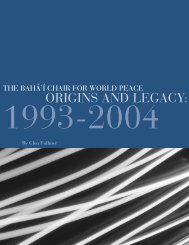who medicines strategy - libdoc.who.int - World Health Organization
who medicines strategy - libdoc.who.int - World Health Organization
who medicines strategy - libdoc.who.int - World Health Organization
You also want an ePaper? Increase the reach of your titles
YUMPU automatically turns print PDFs into web optimized ePapers that Google loves.
WHO MEDICINES STRATEGY 2004-2007 | 80EO 4.5Public-<strong>int</strong>erest NGOs includedin medicine supply strategies, insupport of national medicine supplystrategies to reach remote areasRationalePublic-<strong>int</strong>erest NGOs and faith-basedorganizations often work in areas where theprivate for-profit health sector does not haveincentives to exist. These organizations playan important role in meeting the overall healthneeds and medicine requirements of theserural and often disadvantaged populations.WHO, in collaboration with the EcumenicalPharmaceutical Network based in Nairobi, Kenya,has undertaken a study in 10 sub-Saharan Africancountries on <strong>medicines</strong> supply and distributionactivities by faith-based organizations. Preliminaryfindings indicate that these organizations supportthe overall public health sector by covering 40%of the population and support around 80% ofhealth facilities, in mainly rural areas.WHO already works in collaboration with manypublic-<strong>int</strong>erest NGOs, is involved in trainingcourses for NGO personnel, and has publishedpapers on NGO contributions. Another exampleis the close collaboration with Médecins SansFrontières (MSF) in the production of a jo<strong>int</strong>report about MSF’s experiences in procuring andsupplying ARVs in 10 countries where it operatesHIV/AIDS treatment programmes 41 . WHO alsoworks with <strong>int</strong>ernational non-profit suppliers oflow-cost essential <strong>medicines</strong>, in particular on thecomposition and distribution of the WHO NewEmergency <strong>Health</strong> Kit, and through the GreenLight Committee for the supply of <strong>medicines</strong> formultidrug-resistant TB.As a result, faith-based organizations such asthose in the African Region have substantialexperience in the successful management ofmedicine supplies, mostly through a pooledpurchase mechanism (e.g. Ghana, Nigeria,Malawi, Zambia, Kenya, and Uganda). Inmost cases, they operate efficiently, havewell-motivated staff, and have adopted soundmanagement principles, including accountability.Although their skills, experience, andachievements are not always recognized or usedby national governments, some governmentsdo acknowledge the contribution of theseorganizations and collaborate with them to jo<strong>int</strong>lysupply and distribute <strong>medicines</strong> supplies in thepublic health sector. The Jo<strong>int</strong> Medical Stores inUganda and Mission of Essential Medicines andSupplies in Kenya are good examples of this kindof collaboration.











